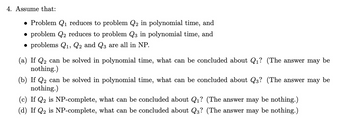Question
Please show steps clearly

Transcribed Image Text:4. Assume that:
• Problem Q₁ reduces to problem Q2 in polynomial time, and
• problem Q2 reduces to problem Q3 in polynomial time, and
• problems Q1, Q2 and Q3 are all in NP.
(a) If Q₂ can be solved in polynomial time, what can be concluded about Q₁? (The answer may be
nothing.)
(b) If Q₂ can be solved in polynomial time, what can be concluded about Q3? (The answer may be
nothing.)
(c) If Q2 is NP-complete, what can be concluded about Q₁? (The answer may be nothing.)
(d) If Q2 is NP-complete, what can be concluded about Q3? (The answer may be nothing.)
Expert Solution
This question has been solved!
Explore an expertly crafted, step-by-step solution for a thorough understanding of key concepts.
This is a popular solution
Trending nowThis is a popular solution!
Step by stepSolved in 3 steps

Knowledge Booster
Similar questions
- ### Problem 4 Let `G` be a graph with `n vertices and `m` edges. True or false: All its DFS forests (for traversals starting at different vertices) will have the same number of trees? True or false: All its DFS forests will have the same number of tree edges and the same number of back edges? Explain your answerarrow_forwardInstruct us on the ways of the arithmetic operators, please.arrow_forwardModulo Rules (Discrete Math) Use mod to find the remainder. Write it step by step( include mod) for each steps. Write the steps neatly please The answer is provided.arrow_forward
- At least a paragraph with simlier example Looking at how computers are able to store words in their memory using the ASCII character set. Choose a short phrase with at least 2 words and then convert each character in that phrase to hexadecimal using the ASCII table provided in this module. Make sure that you also convert any spaces and punctuation in your chosen phrase! In your post, tell me what phrase you chose and then write out the hexadecimal representation of that phrase with spaces between each hex number. For example, lets say the phrase I choose is "Hello World". To convert that to hexadecimal, I would bring up the ASCII table and look up each character in my phrase. First I would look up "H" and see that it has the code 48. Then I would look up "e", which has the code 65. Then "l", which becomes 6C. I would continue this way until I have converted the whole phrase to hexadecimal (including the space between the words, which has code 20). The complete encoded phrase ends up…arrow_forwardCode in C language. Follow instructions in photo. Use text provided as input.txt file. A1, A2 20294 Lorenzana Dr Woodland Hills, CA 91364 B1, B2 19831 Henshaw St Culver City, CA 94023 C1, C2 5142 Dumont Pl Azusa, CA 91112 D1, D2 20636 De Forest St Woodland Hills, CA 91364 A1, A2 20294 Lorenzana Dr Woodland Hills, CA 91364 E1, E2 4851 Poe Ave Woodland Hills, CA 91364 F1, F2 20225 Lorenzana Dr Los Angeles, CA 91111 G1, G2 20253 Lorenzana Dr Los Angeles, CA 90005 H1, H2 5241 Del Moreno Dr Los Angeles, CA 91110 I1, I2 5332 Felice Pl Stevenson Ranch, CA 94135 J1, J2 5135 Quakertown Ave Thousand Oaks, CA 91362 K1, K2 720 Eucalyptus Ave 105 Inglewood, CA 89030 L1, L2 5021 Dumont Pl Woodland Hills, CA 91364 M1, M2 4819 Quedo Pl Westlake Village, CA 91362 I1, I2 5332 Felice Pl Stevenson Ranch, CA 94135 I1, I2 5332 Felice Pl Stevenson Ranch, CA 94135 N1, N2 20044 Wells Dr Beverly Hills, CA 90210 O1, O2 7659 Mckinley Ave Los Angeles, CA 90001arrow_forwardPlease explain the character set in as few words as possible.arrow_forward
- Assignment-5 Create flow chart and algorithm for following problem: Check whether the inputted number is a. Positive b. Negative C. zeroarrow_forwardoctal numbers are made using the eight digits 0,1,2,3,4,5,6,7. How many octal numbers are 4 digits long, where the first digit must be from 1 to 7arrow_forwarduse visual basicarrow_forward
arrow_back_ios
SEE MORE QUESTIONS
arrow_forward_ios